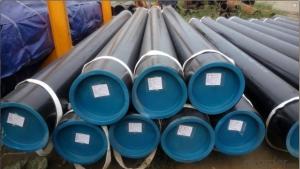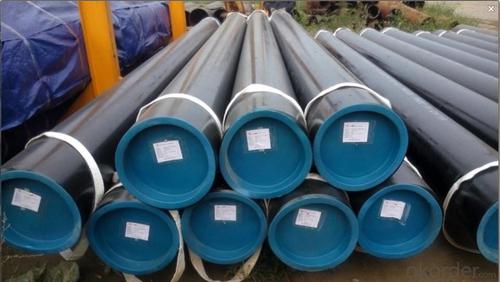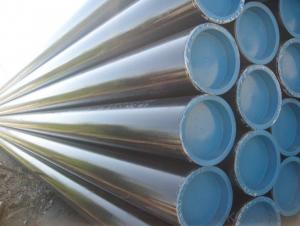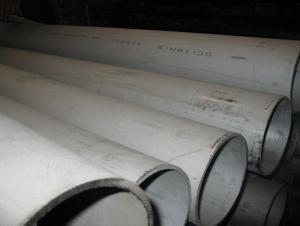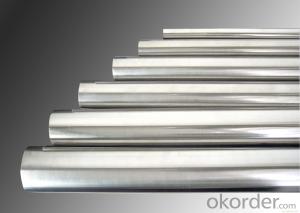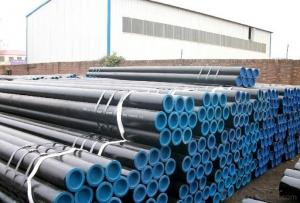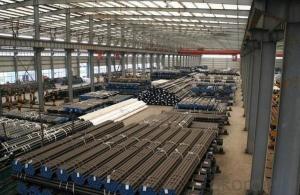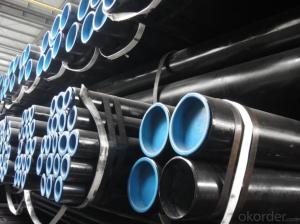Hot rolled black seamless steel tube Gr.B
- Loading Port:
- Tianjin
- Payment Terms:
- TT OR LC
- Min Order Qty:
- 10 m.t.
- Supply Capability:
- 10000 m.t./month
OKorder Service Pledge
OKorder Financial Service
You Might Also Like
1. Commodity Name: Seamless steel pipe
2. Standard: API,GB,ASTM,ASME,DIN
3. Quality grade: 10#, 20#, A106B, A53B, API 5L B, Q235, Q345, ST37-2, ST 45, ST52.etc.
4. Dimension:
OD: 1/2"-24"
WT: 2.5-80mm, SCH10~SCH40~XXL
length: 5.8m,6m,8m,9m,12m
5. Technique: Hot Rolled/Cold Rolled/ Cold Drawn
6. application
carbon seamless steel pipes are widely used in gas, water and oil, transpotation;constructions;Bridge,highway,windows of model steel door; building materials;fences;heating facilities Fluid Pipe;conduit pipe,scaffolding pipe.etc.
7. Payment Terms: L/C D/A D/P T/T
8.packing and shipment
Packaged in bundles,as per customers' requirements, it can also bepackagesd as beveled ends, typed marking, black painting, plastic caps protection,woven bags packing
For 20" container the max length is 5.8m; For 40" container the max length is 12m. other options are available based on customer requests. Please discuss when placing orders.
9. Surface: painted with varnish;
10. Plastic caps at ends.
11. Tolerance: OD +1%/-1%
WT +12.5%/-10%
12. Chemical composition:
Models of Steel Pipes | Chemical Component | |||||||
Steel 20 (ASTM A106B) | C | Si | Mn | P | S | Cu | Ni | Cr |
0.17~0.24 | 0.17~0.37 | 0.35~0.65 | 0.035max | 0.035max | 0.25max | 0.25max | 0.25max | |
Steel45 (ASTM 1045) | 0.42~0.50 | 0.17~0.37 | 0.50~0.80 | 0.035max | 0.035max | 0.25max | 0.25max | 0.25max |
16Mn(Q345B) | 0.12~0.20 | 0.20~0.55 | 1.20~1.60 | 0.035max | 0.035max | 0.25max | 0.25max | 0.25max |
45Mn2 ( ASTM1345) | 0.42~0.49 | 0.17~0.37 | 1.40~1.80 | 0.035max | 0.035max | 0.3max | 0.3max | 0.30max |
- Q: Can steel pipes be used for conveying chemicals?
- Yes, steel pipes can be used for conveying chemicals. Steel pipes are known for their high strength and durability, making them suitable for transporting various chemicals. Additionally, they are resistant to corrosion, which is crucial when dealing with corrosive substances. However, it is important to consider the specific type of chemical being transported and ensure that the steel pipes are compatible with it to avoid any chemical reactions or damage to the pipes.
- Q: What is the difference between steel pipes and plastic pipes?
- The main difference between steel pipes and plastic pipes lies in their material composition. Steel pipes are made from a durable and strong metal alloy, while plastic pipes are composed of various types of plastic polymers. This difference in materials leads to variations in their properties and usage. Steel pipes are known for their high strength, resistance to extreme temperatures and pressures, and longevity, making them suitable for applications requiring robustness, such as in industrial settings or underground pipelines. On the other hand, plastic pipes are lightweight, flexible, and corrosion-resistant, making them ideal for plumbing, irrigation, and other non-industrial applications. Additionally, plastic pipes are easier to install and handle due to their lighter weight and flexibility compared to steel pipes.
- Q: How do steel pipes handle thermal expansion and contraction?
- Steel pipes handle thermal expansion and contraction by allowing for slight movement and flexibility. When heated, the steel pipe expands, and when cooled, it contracts. To accommodate these changes, expansion joints or loops are often incorporated into the pipe system. These joints or loops allow the pipe to expand and contract without causing stress or damage. Additionally, proper insulation and support are essential to minimize the effects of thermal expansion and contraction on steel pipes.
- Q: What are the different methods of joining steel pipes?
- There are several different methods of joining steel pipes, including welding, threading, flanging, grooving, and using mechanical connectors.
- Q: How are steel pipes protected against fire hazards?
- Steel pipes are protected against fire hazards through various methods such as fire-resistant coatings, fire wraps, or fireproof cladding. These protective measures prevent the pipes from being exposed to high temperatures and flames, ensuring their structural integrity and reducing the risk of fire-related incidents.
- Q: How do you calculate the pipe pressure drop coefficient for steel pipes?
- To determine the pipe pressure drop coefficient for steel pipes, one can utilize the Darcy-Weisbach equation. This equation establishes a relationship between the pressure drop within a pipe and various factors, including the flow rate, pipe diameter, pipe length, and the properties of the fluid being conveyed. The pressure drop coefficient, also known as the friction factor or the Darcy-Weisbach friction factor, is represented by the symbol f and is dimensionless. It denotes the resistance to flow within the pipe. The value of f is contingent upon the flow regime, which can either be laminar or turbulent. In the case of laminar flow, occurring at low flow rates or with viscous fluids, the pressure drop coefficient can be determined through employment of the Hagen-Poiseuille equation. This equation relates the pressure drop to the fluid viscosity, pipe length, pipe diameter, and flow rate. However, for turbulent flow, arising at higher flow rates, the calculation of the pressure drop coefficient becomes more intricate. It is influenced by the roughness of the pipe wall, which impacts flow resistance. Typically, roughness is quantified using the relative roughness, defined as the ratio of the pipe wall roughness to the pipe diameter. To compute the pressure drop coefficient for turbulent flow in steel pipes, empirical correlations or Moody's diagram can be utilized. Moody's diagram provides a graphical depiction of the friction factor as a function of the Reynolds number and relative roughness. The Reynolds number characterizes the flow regime and is determined using fluid properties, flow rate, and pipe dimensions. By identifying the intersection of the Reynolds number and relative roughness on Moody's diagram, one can ascertain the corresponding pressure drop coefficient. It is crucial to note that the pressure drop coefficient for steel pipes may vary depending on specific pipe dimensions, surface roughness, and fluid properties. Consequently, it is advisable to refer to relevant standards or engineering sources for precise and current values of the pressure drop coefficient for steel pipes in a particular application.
- Q: How do steel pipes handle water hammer in high-rise buildings?
- Steel pipes in high-rise buildings are designed to handle water hammer by incorporating various features. Firstly, these pipes are often equipped with pressure relief valves or surge tanks that absorb and dissipate the sudden pressure changes caused by water hammer. Additionally, engineers use techniques such as proper pipe sizing, installation of air chambers, and use of flexible connectors to minimize the effects of water hammer. These measures help to reduce the sudden pressure spikes and prevent damage to the pipes and other plumbing components in high-rise buildings.
- Q: Is the diameter of the steel tube indicated by the outer diameter by the wall thickness or by the inside diameter by the wall thickness?
- Seamless steel pipe specifications are: outer diameter, wall thickness, material. Three of these reflect its main features.Welding pipe specifications are: nominal diameter (internal diameter), galvanized or non plated
- Q: How are steel pipes inspected for quality?
- The quality of steel pipes undergoes a thorough examination process involving diverse techniques and standards. Trained professionals conduct visual inspections to scrutinize the pipes for visible defects such as cracks, dents, or surface irregularities. This examination guarantees that the pipes meet the required specifications and are devoid of any visible flaws. Furthermore, non-destructive testing (NDT) methods are utilized to assess the internal and external quality of the steel pipes. Among the commonly used NDT techniques, ultrasonic testing stands out. This method involves transmitting ultrasonic waves through the pipes to detect any internal defects or inconsistencies in the material. It effectively identifies issues such as variations in wall thickness, inclusions, or weld defects that could compromise the pipe's integrity. Another widely employed NDT technique is magnetic particle inspection. By utilizing magnetic fields and iron particles, this method identifies surface cracks or flaws in the steel pipes. It is particularly effective for detecting defects in ferromagnetic materials and can be performed on both the outer and inner surfaces of the pipes. Moreover, hydrostatic testing is frequently conducted to evaluate the strength and pressure resistance of the pipes. This process involves filling the pipes with water or a suitable fluid and subjecting them to a specified pressure to check for leaks or structural weaknesses. This test ensures that the pipes can withstand the intended operational conditions without failing. In addition to these techniques, various quality control measures are implemented throughout the manufacturing process. These measures include material traceability, dimensional checks, and chemical composition analysis. They play a crucial role in ensuring that the steel pipes meet the required standards and specifications, thereby guaranteeing their quality and reliability. In summary, the inspection of steel pipes for quality involves a comprehensive approach encompassing visual inspection, non-destructive testing methods, and quality control measures. These thorough procedures enable the identification of defects, inconsistencies, or weaknesses, ensuring that the pipes meet the necessary quality standards and are suitable for their intended purpose.
- Q: Can steel pipes be used for steam systems?
- Yes, steel pipes can be used for steam systems. Steel pipes are commonly used in steam systems due to their high strength and heat resistance properties. They are capable of withstanding high temperatures and pressures, making them suitable for transporting steam safely and efficiently.
Send your message to us
Hot rolled black seamless steel tube Gr.B
- Loading Port:
- Tianjin
- Payment Terms:
- TT OR LC
- Min Order Qty:
- 10 m.t.
- Supply Capability:
- 10000 m.t./month
OKorder Service Pledge
OKorder Financial Service
Similar products
Hot products
Hot Searches
Related keywords
